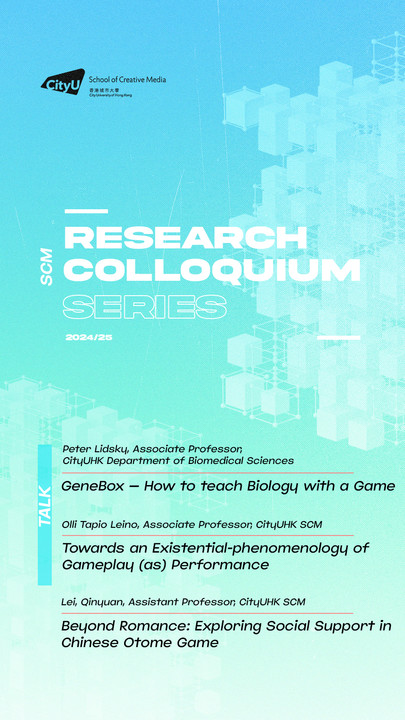6th SCM Research Colloquium 2024/25
Seminar
04 Mar 2025
3:15 p.m – 5:45 p.m
M6058 Screening Room 2, Level 6, Run Run Shaw Creative Media Centre
Free admission.
|

|
The SCM Research Colloquium takes place approximately once a month for taught postgraduate, graduate students, faculty and professionals from creative media and other related disciplines to present their recent research topic/project. The colloquium offers a great opportunity for ideas exchange and intellectual conversations about one’s work. Each session will feature two speakers, a graduate student/guest speaker and a faculty member.
Each presentation is about 30 minutes, followed by 15 minutes open discussion. Seminar introduction and Q&A will be hosted by Prof. Espen Aarseth or Prof. Richard Allen. No registration is needed and light refreshments are provided.
Seminar 6
4 March 2025, 3:15 p.m – 5:45 p.m
GeneBox – How to teach Biology with a Game
Peter Lidsky
GeneBox is an interactive learning app with video game functionality that can teach students concepts about biology, particularly genetics, cellular, and molecular biology, with the main focus on gene regulatory networks. Students should design their own circuits that define the microbe’s behavior. GeneBox allows the delivery of complex algorithmic information in an interactive and joyful environment. The proposed project aims to improve GeneBox as a compelling game and as a didactic tool to boost Generation Z students' learning of biology. If successful, GeneBox will be used by teachers in various biological disciplines at CityU and worldwide, and the project will be able to fund its future development through donations or sales. I want to discuss potential ways of project development and the challenges we encounter. The current version of the app can be found here: https://tntc-lab.itch.io/genebox

Towards an Existential-phenomenology of Gameplay (as) Performance
Olli Tapio Leino
The art-status of computer games has gained significant attention in recent years, yet questions about freedom, creativity, and agency persist. A fundamental tension exists between the player, who seeks to master and personalize the game, and the artist/designer, whose authority over the game's meaning is challenged. This tension is unique to computer games and contrasts with virtual worlds or interactive installation art, where such conflicts do not arise. Particularly evident in 'art games,' designers often employ "abusive game design" (Wilson & Sicart, 2010) to maintain a hold of authorship by intentionally breaking the game’s mechanics or semiotics, leading to experiences of futility and emptiness which only the designer themselves can resolve. To redefine games as targets of aesthetic criticism and uncover their artistic value, I propose viewing gameplay as a spatiotemporally situated performance (Fischer-Lichte, 2008; Schechner, 2003), shifting the primary locus of significance from the game artifact to a performance involving both the player's technologically extended embodied subjectivity and audience's "x-morphic" (cf. Latour/Aramis 173) relation to the performer and the performance. This approach requires adapting Fischer-Lichte’s aesthetics to accommodate gameplay's unique dynamics, offering a three-fold phenomenology that considers the game world, player-performer, and audience interaction. By examining examples like Westerlaken's "vegan run" of Zelda: Breath of the Wild and Delappe's Dead-in-Iraq (2006-11), this perspective challenges the "ludological" paradigm (Eskelinen, 2001; Frasca, 2003; Juul, 2003) by bringing gameplay-as-performance within the scope of game hermeneutics, offering insights into phenomena like live-streaming, thereby diverging from the prevailing paradigm based on sports spectatorship (Jin, 2021; Taylor, 2015, 2018).
Beyond Romance: Exploring Social Support in Chinese Otome Game
Lei, Qinyuan
What happens when a video game designed for profit becomes a space of social support among young women? This talk delves into the unexpected social dynamics emerging from Mr. Love: Queen’s Choice (戀與製作人), a Chinese otome game marketed to young women as a romantic simulation. While the game’s primary aim is commercial — capitalizing on a demographic often marginalized in gaming culture (young female gamers) — the gamers have transformed it into a thriving community of mutual support. Drawing on ethnographic fieldwork, including participant observation and semi-structured interviews with members, I unpack how this community shares various types of social support through their common passion for the game. By centering their voices, this talk reveals how marginalized female gamers reclaim agency through community formation and mutual social support. Ultimately, the findings contribute to broader conversations about the potential of games to foster mediated social support, even within systems not explicitly designed for such purposes. Join me to rethink how gaming communities can transcend profit-driven designs to create digital spaces of empowerment and belonging.
